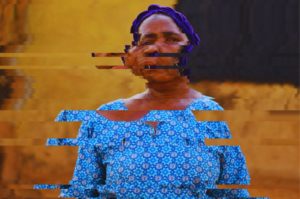
My watch tells me that I miss him by 98%. I clock this as accurate, given that I’m now awake from the first dream I’ve had of him since he passed. There was something going on at home, a ceremony that I was helping prepare for. I had a dish half-filled with warm, soapy water and a drying cloth thrown over my wrist. I carried the dish into a room where the elder men of the family were gathered, but at the door, I tripped and spilled the water on the floor. Some of the men clapped, shaking their heads in disappointment; my grandfather was among the disappointed. The shame and guilt were real, visceral; I didn’t know it was only a dream until I awoke still crying. I turned over to check the time. Instead, I saw the details of the emotions that were settled in my chest, spreading to my limbs: longing, sadness, uncertainty.
I miss him by 98%. I get out of bed quickly to avoid lingering too long on the dream’s effects on my psyche. There is much to do today, and I need to be focused, balanced, stable. It helps to do strenuous exercise when that combination is the goal. After an hour of lifting weights and running, the reading is stabilised again: I am 80% composed, 12% alert, 8% uncertain.
My grandfather is the first one in our family to be buried through a CALL. The Cemeteries for Ancestral Legacy and Longevity was the only solution the government had to the crises of land and burial grounds. The issue was manageable at first, then it became dire. Bodies were rested atop other bodies for lack of space. Parents buried with their children; daughters buried on top of their mothers-in-law. There were complications when, say, a family wanted to beg forgiveness from one elder while another was there, possibly eavesdropping and feeling neglected. It was awkward when the one person in the grave was a family’s beloved and the other, not so much. Soon, there was no longer any space for collective graves, so bodies were burned to ash despite families’ concerns. Now, however, there is an option to have bodies kept in smart graves that look like the fridges at mortuaries. To eliminate the necessity for visiting a smart grave, there is a mediator between the living and deceased that maintains the connection on the family’s behalf.
It’s been three weeks since my grandfather has been buried in a CALL, and today we should expect the process to be complete so that, when I am logged in, I can maintain a connection with him remotely, as needed. A month ago, when I began the process with my grandmother, she froze and looked at me in severe confusion when she read the question on the application: “Would you like to maintain contact with Moses Mmeli Mabelane as an ancestral authority? YES/NO”
For the sake of consistency and accuracy, only one member of the family can have a CALL connection on their phone. My grandmother chose me to be the one. As the first and only daughter of her only son’s children, I would be best attuned to the family’s condition and needs. I was also the one, she reminded everyone in our family, that signed up for this “fancy and advanced” burial policy that would ensure my grandfather had his own burial site. She says this with pride; I brush it off as a burden. One’s connection to seemingly affluent means is not always something to applaud where other members of our family are concerned. This must be where my uncertainty comes from: what if something goes wrong? Other family members are incredulous for various reasons, not excluding their apprehensions with anything “advanced.”
“You mean that CALL thing, oh? The one that was in the news now-now for manipulating people’s feelings to influence voting decisions?” I don’t need to think hard to remember what my younger mother, my mother’s younger sister, is referring to. There were rumours that CALL used people’s biometric readings to manipulate their ancestral connections and thus influence their decisions and actions. During voting season, for instance, people reported that their connections must’ve detected feelings of apprehension and doubt towards the ruling party because their CALL would blink yellow to show that the deceased were displeased and the living had to change their mind or course of action about an important decision. Of course, the CALL operators and mediators denied these claims on the basis that, although biometrics are used concurrently with their sites to monitor and maintain the familial bonds between the living and deceased, there was no telling exactly what the deceased could be displeased about without further analysis. Further analysis, however, comes with additional costs that many cannot afford, so the living are doomed to keep guessing what the spirits want from them.
The readings are often vague and colour-coded with no detailed explanations. White means there is peace; everything is going well and the ancestors are pleased. Keep up the good work. Yellow asks for the living to be cautious and to, where possible, change their hearts or actions about a particularly important decision. You might want to reconsider marrying the girl you are currently with or applying for a certain degree. Red is a plea for remembrance. Here, you can decide if you want to make a small offering or hold a small ceremony for the ancestor. Mediators are employed to help you clarify what would best please the ancestor. And black, which is a unique but not uncommon reading, requires a sacrificial offering, whether of a larger animal at a ceremony or of your life through committing yourself to CALL as a mediator.
Mediation is demanding work because you are required to cultivate a gift in translating the spiritual into the digital, and vice versa. Many try to defer it when they see the black reading. Of course, there have been numerous scams associated with this reading, and this is one of the things my younger mother brings up when she crinkles her nose at me and scoffs at the concept. “So, you want my husband to be buried on top of his father and his son? Or you want his body burned to nothing, is that it?” My younger mother retreats at my grandmother’s retort, but I can read from her face that this is not the last she will say about this.
Outside, I tell my brothers to fetch the bags of vegetables from the boot of my car. At 17 and 23, they are now men in their own eyes, which they keep reminding me of. “You don’t have to send us around like we’re kids, sesi,” Mzamo says.
“You can send around the little cousins when everyone else gets here,” Mfundo agrees. I slap their shoulders and repeat my instruction. They run off, laughing and pretending to be injured. They strive to be like him, I see it. They called him the king of our family, the big man who made everything happen with his gentle strength, pride and careless laughter. As I watch the rest of our family drive into the yard through the window in the kitchen, I wonder what will become of us now that he is gone. Different cars pull in, carrying the different branches of the tree that Mkhulu Moses planted, cultivated and held up with his bare hands.
The fear I felt when I heard he was sick was unbearable, and it haunts me still. I wasn’t ready to let go, give him up. How would we know what do without him? Who would we become without a memorial stone to mark his final resting place or a piece of land to return to when we need to remind ourselves of who he was and is?
The CALL would make the longing less unbearable, I told myself. It would give us something to hold on to, somewhere we could turn to when we need him. I’m glad my grandmother chose me to be the one to monitor it, though I haven’t logged in to check the reading. I am still afraid. My hands shake as I struggle to peel the skin off a potato. Beyond the window, Mzamo is throwing little Percy into the sky. She giggles every time she comes flying back into his arms. That was me at 6 in Mkhulu’s arms. He always threw me a bit higher than the last time, teaching me to be fearless. I ran barefoot on hard earth, chasing after him whenever he left to go run errands. The callouses on my hands belong to his belief that working with bare hands is a sure way to create lovely things. His lessons became me.
Before food is served, we gather under the shade of an avocado tree where my grandfather would sit and read, smoking his pipe. This is the first of many family gatherings without him. We bow our heads and pray. We take a moment to remember Mkhulu Moses and the family he has given to us. My grandmother hides her face behind her palms, and her shoulders tremble. Mzamo and Mfundo are standing by her side, clenching their fists. Against myself, I wonder what the reading on my watch is. I know I am miserable, still uncertain, but I don’t look at the watch to confirm this. When everyone is eating, talking between mouthfuls and laughing hysterically at shared stories and memories – laughing at each other for being so defiantly happy in the face of loss – I look around me. I hear my grandfather’s humour in the men’s stories, I see his kindness in my grandmother’s beaming eyes. I feel the proud callouses of his hands in my own. He’s certainly here and he has always been happy with us. Feeling a calm finally settle in my heart, I begin to trust that he always will be.
Image by Monkey Business Images from Canva










Siphiwe February 14, 2025 00:31
Ah! such a refreshing piece of well-written prose.